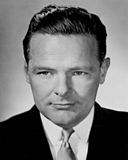United States Senate election in Massachusetts, 1952
|
|
|||||||||||||||||
|---|---|---|---|---|---|---|---|---|---|---|---|---|---|---|---|---|---|
|
|||||||||||||||||
|
|||||||||||||||||
|
|||||||||||||||||
Henry Cabot Lodge, Jr.
Republican
The United States Senate election of 1952 in Massachusetts was held on November 4, 1952. This election marked the end of the Lodge family dynasty and the beginning of the Kennedy family dynasty.
The 1952 Massachusetts Senate election was a contest between two representatives of New England's most prominent political families: the Republican Lodges and the Democratic Kennedys. The Lodges were a much older political dynasty; the family could trace its roots to the original Puritan pioneers who had first settled the state in the early seventeenth century. The Lodges were a "Blue blood" family, and along with several other Boston-area Protestant families, were considered to be at the apex of Massachusetts High Society, and they had been prominent in Boston political and business circles for generations. Lodge's grandfather, Henry Cabot Lodge, Sr., had been a powerful United States Senator from Massachusetts, as well as a close friend and ally of President Theodore Roosevelt; he was also a foe of Woodrow Wilson. His grandson and namesake, Henry Cabot Lodge, Jr., had first been elected to the U.S. Senate in 1936, when he was the only Republican Senate candidate in the nation to defeat a Democratic incumbent. He was easily reelected in 1942. During the Second World War he had resigned his Senate seat and served in the U.S. Army. In 1946 Lodge reclaimed a Senate seat when he defeated Democratic Senator David Walsh.
Lodge's Democratic opponent in the 1952 Senate race was three-term Congressman John F. Kennedy, then only 35 years old. Although the Kennedys were a much newer political dynasty than the Lodges, they had amassed a considerably larger financial fortune, thanks in large part to the business activities of Kennedy's father, Joseph P. Kennedy. The Kennedys were Irish Catholics, and in many ways the 1952 Massachusetts Senate campaign was the climax of a longstanding battle between the older Protestant families like the Lodges, who had controlled politics in the Bay State for generations, and the newer Irish Catholic families such as the Kennedys, who for demographic reasons now outnumbered the Protestants. The Kennedys also viewed the 1952 race as something of a grudge match, as Lodge's grandfather had defeated Kennedy's grandfather, Boston Mayor John F. Fitzgerald, in a 1916 Senate race in Massachusetts.
...
Wikipedia


